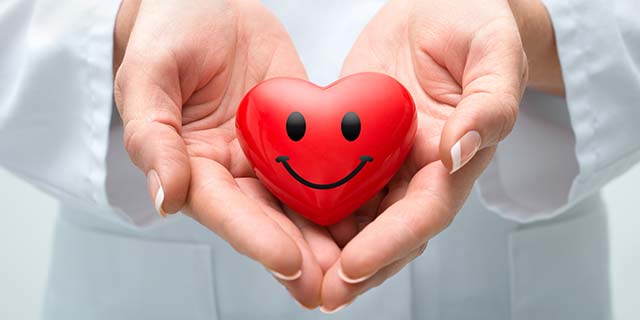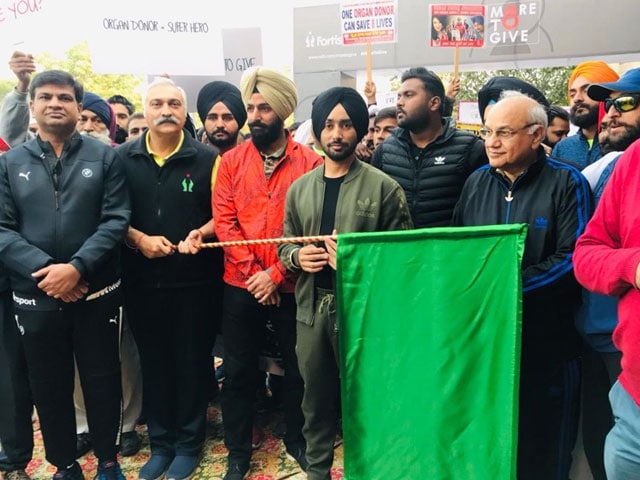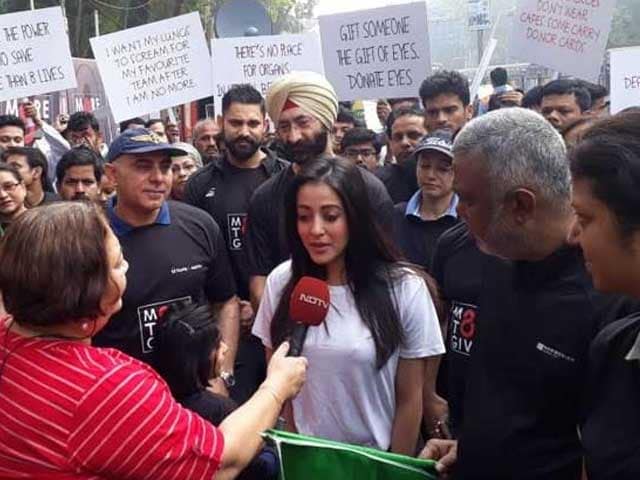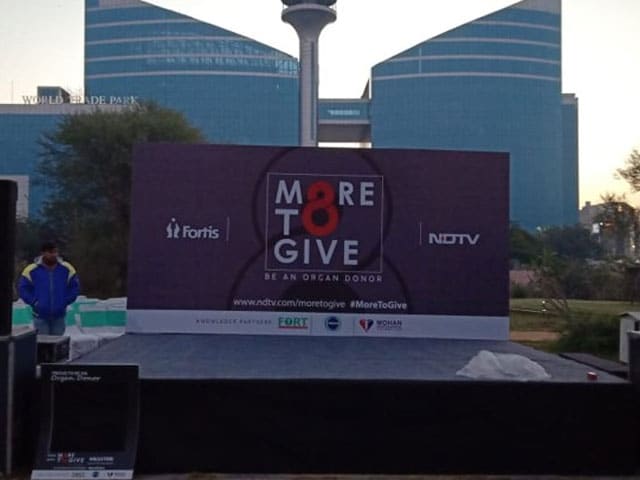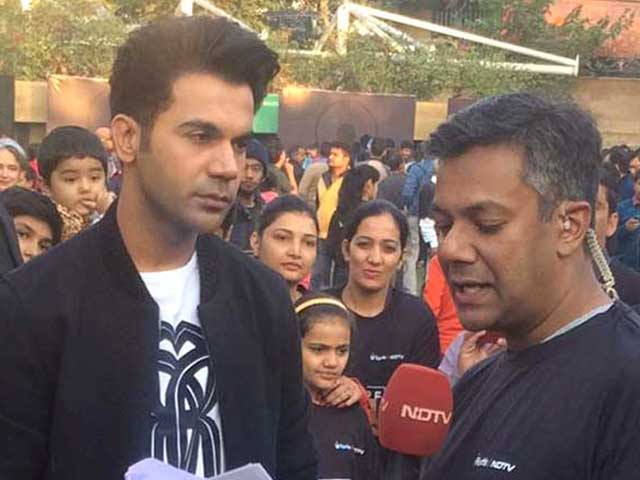Have queries, doubts regarding organ donation? Post your questions for our two experts.
As part of the NDTV-Fortis More to Give intiative, we are inviting questions regarding organ donation to dispel the myths, misconceptions and superstitions around it. Here are the answer to the questions we have received so far. You, too, have questions? Ask Our Experts below.
Avik C: Question 1: I have squint problem in both the eyes (intermittent exotropia), though good eye sight and I do not use glass. Can I donate my cornea?
Question 2: Can I donate only cornea and not any other parts (like skin or bone)?
Question 3: In case of skin or bone donation, does it deform the body visually (asking because this may create trauma for the kin)?
Question 4: What are the organ donation registration centers in Kolkata? Please provide the contact details.
Prof. (Dr.) Vimal Bhandari: 1. Yes, You can donate your cornea, but cornea donation is only possible, when the person is declared dead.
2.You can donate skin and bone after death.
3. No, skin is only taken from lower limbs and back. After removal of skin, the body is covered with bandage. Same in the case of bone donation – after retrieving bone from the body, doctors will place bamboos and restich the body. So, there will be no deformity after removal of skin and bone.
4. Hospitals in Kolkata where you can register to donate: Apollo Gleneagles Hospitals Limited; B.P. Poddar Hospitals & Medical Research Limited; Belle Vue Clinic; Command Hospital Eastern Command; Desun Hospital & Heart Institutes; DM Hospitals; Forits Hospitals & Kidney Institutes; Fortis Hospitals Limited; Medica Super Specialty Hospitals; Narayana Hrudayalaya Hospitals; SSKM Hospital; The Calcutta Medical Research Institute; The Mission Hospital, Durgapur; Woodlands Hospital & Medical Research Centre.
Shweta Nigam: Ten years ago I suffered from synovial sarcoma. I am fine now; can l donate my organs?
Prof. (Dr.) Vimal Bhandari: Yes, you can donate your organs.
Arvind Dixit: Question 1: Who should I contact to pledge my organs?
Question 2: Is it possible to pledge the organs as well as the whole body?
Prof. (Dr.) Vimal Bhandari: 1. You can pledge online or offline. To pledge online, you can visit the NOTTO website and fill the form. To pledge offline, you can download form 7 from our website, fill it and submit to the NOTTO Office. NOTTO will issue a donor card. You can also pledge your organs here.
2. Organ donation is only possible when the patient is in ICU of the hospital and declared as brain dead, while body donation is possible in any condition in home or hospital death. So you can pledge for both. But both body donation and organ donation comes under different acts. You have to fill different forms for both.
Bivash Pandav: I wish to donate all my organs after my death. How can I do it legally so that my family members will have no objection to it?
Prof. (Dr.) Vimal Bhandari: Pledge to donate your organs, and discuss your wish with your family. At the time of death, the body will be in the lawful possession of family members. Know more here.
Kanchan Jaswani: I live in Poland. My earnest desire is to donate all my organs after my death. Since I do not live in India, is it possible? And how? Pls do help me. I am 51 years old Indian woman , born and brought up in Mumbai, living with my husband in lodz, Poland, for the last 4 years .
Prof. (Dr.) Vimal Bhandari: Organ donation is only possible when the patient is in ICU of a registered hospital and declared brain dead by the Brain Death Committee. It comes under the purview of that country laws at the time of death.
Amita Hajela: I am a type 2 diabetic with family history of the condition. Can I donate blood in my lifetime/other organs after my death?
Prof. (Dr.) Vimal Bhandari: Organ donation is only possible when the patient is in ICU of a hospital and declared brain dead. You can donate your organs only if they are deemed fit for the same after a thorough medical check-up at the time of death. Know more here.
Have queries, doubts regarding organ donation? Post your questions for our two experts – Prof. (Dr.) Vimal Bhandari, Director of the National Organ & Tissue Transplant Organization (NOTTO) which comes under the Centre’s Ministry of Health & Family Welfare; and Dr. Harsha Jauhari, Chairman & Sr. Consultant, Department of Renal Transplant Surgery at Sir Ganga Ram Hospital, New Delhi, and Head of the Transplant Services at Artemis Health Sciences Institute in Haryana’s Gurgaon. More about the experts below.
Our Experts:
Prof. (Dr.) Vimal Bhandari

He is a consultant and professor of Surgery at VMMC & Safdarjung Hospital; and an advisor to the Union Public Service Commission (UPSC). He is also the Director of the National Organ & Tissue Transplant Organization (NOTTO), Directorate General of Health Services, Ministry of Health & Family Welfare, Government of India.
Additionally, he’s a visiting professor to Russian University Moscow and Belarus.
Dr. Harsha Jauhari

M.S.(Gen.Surg.), F.R.C.S., F.I.C.S., F.A.I.S., Diplomate in Medical Ethics & Law, Dr. Harsha Jauhari graduated from Armed Forces Medical College, Pune (1968-72). He was awarded M.S.(Gen.Surg) from G.S.V.M. Medical College, Kanpur (1973-76) and was elected F.R.C.S. in 1983. He returned to India in 1988 to serve the country by setting up transplant programs Delhi, Uttar Pradesh, and Haryana.
He has been the Chairman & Sr. Consultant, Department of Renal Transplant Surgery at Sir Ganga Ram Hospital, New Delhi, for the past 28 years. He is also heading the Transplant Services at Artemis Health Sciences Institute, Gurgaon, Haryana.
